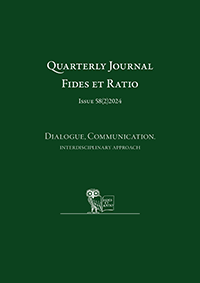Abstract
The term "artificial intelligence" (AI) refers to computer programs equipped with numerous competencies, such as making calculations, grouping and categorizing data, or communicating with the user in ethnic languages. On the other hand, artificial intelligence systems do not have certain properties, and among them, apart from the lack of "creative abilities", is indifference to the moral aspect of actions when searching and compiling data or cataloging phenomena.
This study aims to discuss selected reasons for this state of affairs in the context of machine learning (ML) methodology, including the issues and applications of artificial intelligence from the perspective of scientific communication that occurs in the educational process. Given this goal, a research problem was formulated in the form of a question: How are ethical competencies developed in the machine learning process in the context of communication occurring in the educational process? In order to answer this research question, the text analysis method and the synthesis method were used. As a result of the research, it was determined that conducting machine learning with human participation, as well as using artificial intelligence systems previously learned with human participation, may enable the transmission of moral content in the normative sense to a cybernetic machine. Since human participation allows supervised learning of cybernetic machines, this type of learning, used as the sole method or in combination with another method, offers the opportunity to provide applications with the desired information about socio-cultural rules. Fully independent training of cybernetic machines does not ensure they collect information on ethical aspects desirable in communication during the educational process because open data sets on which machine learning takes place may contain harmful content, amplifying negative social phenomena.
References
Artificial Intelligence Act, European Parliament legislative resolution of 13 March 2024 on the proposal for a regulation of the European Parliament and of the Council on laying down harmonized rules on Artificial Intelligence (Artificial Intelligence Act) and amending certain Union Legislative Acts (COM(2021)0206 – C9-0146/2021 – 2021/0106(COD). (From:) https://www.europarl.europa.eu/doceo/document/TA-9-2024-0138_EN.pdf (access: 15.03.2024).
Bishop, J.M. (2018). Is Anyone Home? A Way to Find Out If AI Has Become Self-Aware, Frontiers in Robotics and AI, 5. https://doi.org/10.3389/frobt.2018.00017
Chojnowski, M. (2019). Zrozumieć decyzje podejmowane przez maszyny. (From:) https://www.sztucznainteligencja.org.pl/badacze-z-google-brain-opracowali-system-pozwalajacy-wydobyc-z-modeli-si-informacje-o-stosowanych-kryteriach-oceny/ (access: 15.02.2024).
Domingos, P. (2015). The master algorithm: How the quest for the ultimate learning machine will remake our world. New York: Basic Books.
Finnis, J. (2001). Prawa naturalne i uprawnienia naturalne.Warszawa: Dom Wydawniczy ABC.
Flasiński, M. (2020). Wstęp do sztucznej inteligencji. Warszawa: Wydawnictwo Naukowe PWN.
Hoes, F. (2019). The Importance of Ethics in Artificial Intelligence. (From:) https://towardsdatascience.com/the-importance-of-ethics-in-artificial-intelligence-16af073dedf8 (access: 2.02.2024).
Kamiński, E., Uczenie maszynowe: z nadzorem i bez nadzoru. (From:) https://analityk.edu.pl/uczenie-maszynowe-z-nadzorem-vs-bez-nadzoru/ (dostęp:10.03.2024).
Kasperska, A. (2017). Problemy zastosowania sztucznych sieci neuronalnych w praktyce prawniczej. Przegląd Prawa Publicznego, 11.
Kulczycki, E. (2017). Komunikacja naukowa w humanistyce.Poznań: Wyd. IF UAM.
Maj. A. (2016). Aksjologia pedagogiczna. (In:) K. Chałas, A. Maj (eds.), Encyklopedia aksjologii pedagogicznej, Radom: Polskie Wydawnictwo Encyklopedyczne.
Massey, G., Ehrensberger-Dow, M. (2017). Machine learning: Implications for translator education. Lebende Sprachen, 62(2).
McCarthy, J., Minsky, M. L., Rochester, N., & Shannon, C.E. (2006). A Proposal for the Dartmouth Summer Research Project on Artificial Intelligence, August 31, 1955. AI Magazine, 27(4), 12. https://doi.org/10.1609/aimag.v27i4.1904
Reinforcement Learning and the Importance. (From:) https://datascience.eu/machine-learning/machine-learning-for-humans-part-5-reinforcement-learning/ (Accessed: January 20, 2024).
Okoń, W. (1998). Nowy słownik pedagogiczny. Warszawa: Wydawnictwo Akademickie „Żak”.
Sala, K. (2017). Przegląd technik grupowania danych i obszary zastosowań, Społeczeństwo i Edukacja. Międzynarodowe Studia Humanistyczne, 2(25).
Sierocka, B. (2016). Etyka współodpowiedzialności czyli moralność wywiedziona z międzyludzkiej komunikacji. Rocznik Bezpieczeństwa Międzynarodowego, 10(1), 186–196.
Starczewski, A., Goetzen, P., Er, M.J. (2020). A New Method for Automatic Determining of the DBSCAN. Parameters, Journal of Artificial Intelligence and Soft Computing Research, 10(3).
Thomas, D., Brown, S.J. (2011). A New Culture of Learning: Cultivating the Imagination for a World of Constant Change. Lexington, KY: Creative Space.
Tomasello, M. (2002). Kulturowe źródła ludzkiego poznawania. Warszawa: PWN.
Wiener, N. (1961). Cybernetyka i społeczeństwo. Warszawa: Wyd. Książka i Wiedza.

